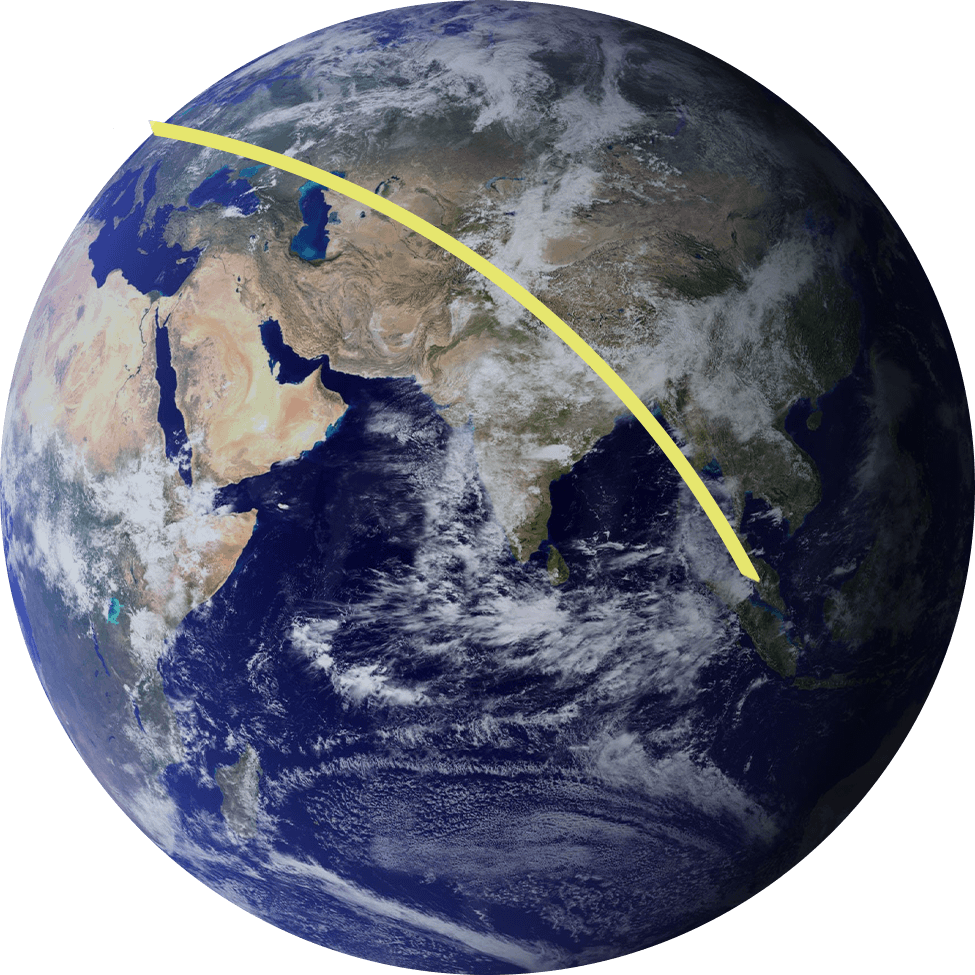Space tourism is coming, and it's going to wreak havoc on Earth's atmosphere
NASA will allow tourists to visit the International Space Station (ISS) as early as next year, and soon companies will begin offering private space flights, charging millions of dollars for the privilege. This could be an effective way to raise money for the high costs of space exploration, but experts say that allowing a few rich tourists to blast off into space could cause long-term damage to the Earth.
At a time when the planet may be teetering on the brink of a devastating climate change tipping point, advocates have questioned the long-term environmental costs of trips to space for the pleasure of a few.



"Space tourism is a wholly unnecessary use of resources by a very small elite of people and organizations," Claudio Magliulo of climate change action group 350 told Digital Trends. "It's an elaborate form of escapism for the 1%"
The effects of rocket launches on the environment have been researched only minimally, but we do know enough to be concerned about their impact. It's not just about carbon: An uptick in launches can also cause long-term damage to the ozone layer. The chemicals burned by rockets work together in the upper atmosphere, and experts say they could eventually deplete up to 1% of the ozone keeping us safe from the sun's radiation.
147
metric tons of refined kerosene
150
metric tons of carbon produced each launch
4.000
metric tons of carbon produced annually
150x
as much carbon dioxide as a transatlantic flight
860.
000.
000
metric tons of carbon produced annually by the aviation industry



The carbon impact of a rocket
Rockets today are increasingly fuel efficient, but it still takes tremendous energy to shoot them into space. A SpaceX Falcon 9 rocket, for example, largely consists of a tank to hold the 147 metric tons of refined kerosene used to achieve orbit.
According to Smithsonian magazine, each Falcon 9 launch produces approximately 150 metric tons of carbon, which would add up to a total of around 4,000 metric tons per year if SpaceX achieves its goal of a launch every two weeks.
That means every rocket launch produces 150 times as much carbon dioxide as a transatlantic flight. Even so, because launches are so rare, the total carbon produced is insignificant next to the approximately 860 million metric tons of carbon produced each year by the aviation industry.
But experts warn that space tourism could still hurt the environment, just not in the way you may think.
Ripping a hole in the atmosphere
The bigger problem with rocket launches is damage done to the atmosphere itself. As a rocket moves through the upper atmosphere, burning kerosene-based fuel as it goes, it deposits chemicals including chlorine into the air around it. Chlorine destroys the ozone molecules that shield the planet from the sun's rays, contributing to global warming.
Chlorine isn't the only thing damaging the ozone layer. Burning rocket fuel also creates black carbon, or soot, and aluminum oxide. The soot particles form a “black umbrella,” which absorbs sunlight and heats up the air around it, and the aluminum oxide particles reflect heat away like aluminum foil. Together, these two effects make the surface of the planet cooler.
That might sound like a good thing, but actually it's damaging, as it cools the surface of Earth at the expense of heating the upper atmosphere. A warmer upper atmosphere means the chemical reactions which deplete the ozone layer happen even faster, exacerbating the problem caused by the chlorine. Basically, as the upper atmosphere gets warmer, the ozone protecting our planet is destroyed faster.
diagram key
ozone layer
chlorine and black carbon cool the surface of the Earth at the expense of heating the upper atmosphere



















We still don't know the full impact
One of the concerns about rocket emissions is the lack of research into the topic, according to Dr. Martin Ross, senior project engineer for commercial launch projects at The Aerospace Corporation. These emissions “could have a more significant role in the totality of Earth’s climate system than aviation CO2 emissions,” he told Digital Trends. “But we do not know enough about rocket particle emissions to say for sure with any degree of scientific clarity. The scientific level of understanding rocket emissions is out of line with their level of potential impacts.”
Because of this lack of research, we don't know exactly how fast rocket launches will deplete the ozone layer – but it's unlikely to be good news. Current estimates show that rocket launches cause up to 0.1% in ozone loss, according to a report by Ross and his colleague Dr. James Veda. If launches go up by a factor of 10 in the next few decades as governments and companies launch more satellites and tourists head up into the cosmos, we could wipe out 1% of the ozone layer.

1%
estimated ozone loss due to rockets, satellites, and tourist launches increasing by a factor of 10
0.1%
current estimated ozone loss due to rocket launches
This threat to the ozone layer is specific to rockets, and could undo the precious progress we've made on repairing ozone depletion in the last 30 years. "Rocket emissions inherently impact the stratosphere in a way that no other industrial activity does," Ross and Veda write.
Depletion of the ozone layer means an increase in harmful UVB radiation which can cause skin cancer and blindness, as well as damage plants and marine ecosystems. Increased solar radiation also substantially raises the amount of carbon dioxide given off in the Arctic, further driving global warming.
When you consider the 3% loss of ozone that caused us to ban CFCs in 1989, the effect of rocket launches doesn't seem so minuscule any more.
Doing it right from the beginning
The number of private space flights is likely to remain very low in the next decade, if only due to the exorbitant cost. But a related area that could see significant growth is suborbital tourist trips. The Virgin Group, headed by British business magnate Richard Branson, has designs on being the first company to offer public trips to the edge of space through its Virgin Galactic program.
These suborbital flights in vehicles like Virgin's SpaceShipOne and SpaceShipTwo produce relatively little carbon dioxide when compared to orbital flights, according to Dr. Steven Fawkes, an energy management expert and managing partner of EnergyPros. Each suborbital trip produces around 3 metric tons of carbon dioxide, which is equivalent to a flight from London to Singapore.
LCY
London City Airport
SIN
Changi Airport Singapore
suborbital flights — vehicle can't enter Earth's orbit due to speed limitations
orbital flights
suborbital flights






Each individual trip could have more of an impact than your typical flight. Like full-on trips to space, chemicals used by ships at high altitudes may have a more significant impact on the environment than those exhausted at lower altitudes, Fawkes said.
In the case of space tourism to the ISS, NASA puts the responsibility for emissions onto the companies running the trips. "NASA provides the destination and capabilities, but the private companies responsible for the launches must work within the appropriate regulatory framework to achieve compliance," Karen Northon of NASA told Digital Trends. SpaceX and Boeing, which will be running tourists' trips to space, did not respond to our request for comment.
Even with large growth in suborbital and orbital tourist flights in the future, projections of carbon emissions are still “tiny compared to aviation,” Fawkes said. “This is not, however, to say that there is no problem. Like all businesses now, space tourism operators should address emissions and all aspects of sustainability. It would be better if they did that right from the beginning.”
Environmental activists compare the issues around private space launches to those around regular tourism – in that the environmental costs apply to everyone but the benefits accrue to only a few. Only the most elite of the elite will ever have the chance to go to space. “Space exploration is valuable,” said Mahir Ilgaz, associate director of research at the climate change action group 350, and offering tourist trips to the ISS “is one way of raising funds. But governments shouldn't fundraise by encouraging damaging practices.”
The potential benefits of private space missions, such an instilling an interest in science and exploration, may not be worth the harm being done to the planet now. Environmentalists would rather focus on the steps that need to be taken to reduce climate change in all areas of life. “When your house is on fire, you have to put out the fire first,” Ilgaz said.
Now is the time to act
Governments around the world have not focused much on regulating emissions from rocket launches. As launches have historically been considered matters of national security, they have typically been exempt from environmental legislation.
But with the increase in the number of private launches, scientists are beginning to seriously consider the impact rocket emissions could have on the environment. And experts in this field say that now is the time to legislate, before the problem becomes more urgent.
“If we understand rocket emission now, while their impacts are still smaller than aviation’s impacts, then proper guidelines and metrics could be established that encourage space industry growth,” Ross said. “If we wait until rocket impacts are large, then such actions might be a burden. Research now would be good for the environment and the launch industry.”
Until legislation is put in place, the inequality of environmental harm caused by space tourism will continue. "Most of us are here on the surface dealing with the full brunt of the climate crisis," Ilgaz said,"while just a tiny number of people are up there having these opportunities."












